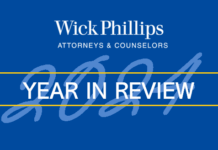
By Erika L. Bright, Partner/Head of Insurance Coverage Practice
erika.bright@wickphillips.com
214.740.4050
As 2017 begins, decision makers should take two key steps to protect your company through insurance: (1) take a fresh look at the coverage your company has and (2) immediately think of insurance when loss or potential liability occurs.
STEP #1 – REVIEWING YOUR COMPANY’S INSURANCE COVERAGE should occur at least once a year and should not wait until the last minute before renewal. Here are foundational questions to consider:
- Policy limits – Has your company grown in size? Has the company taken on any new or increased exposures? Has the company seen, or does it expect, increased litigation? If so, examine whether your company’s existing policy limits adequately address the increased risk.
- Policy coverage – Has your company undergone changes in the way it does business? Has the company expanded into a new area of business? Does your company face meaningful risk other than traditional bodily injury and property damage claims? If so, you should consider whether the company’s existing policies cover those exposures.
- Insurance carriers – Has your company had a positive relationship with its insurance carriers in terms of claims? What are the financial ratings and reputations of your insurance carriers? Not all insurance companies are created equal in terms of the coverage they offer or the way they handle claims.
STEP #2 – THINKING ABOUT INSURANCE REFLEXIVELY WHEN LOSS OR POSSIBLE LIABILITY OCCURS is a must. Here are initial thoughts every company should keep in mind:
- Assume nothing – Companies should not simply assume that their insurance policies will not cover a loss or liability. Liability policies can cover all manner of allegations and claims: breach of contract, negligence, breach of duty, defamation, discrimination, invasion of privacy, fraud, and many others. In the event of loss or possible liability, companies should automatically think about the potential for insurance.
- Give prompt notice – When there is any possibility for coverage, companies should immediately notify their carrier(s) and broker. Review the notice provision in each policy and ensure that it is satisfied. Generally, for liability claims, an insurance carrier will have no obligation to pay for any costs (such as defense costs) unless and until notice is given.
- Question coverage denials – Wrongful denials of insurance claims are common. Sometimes carriers make those decisions in bad faith, but other times the claims personnel are inexperienced or uninformed. Any doubt as to whether the insurance carrier correctly denied a claim should prompt further examination. Wrongful denials should be promptly challenged, as they often can be reversed with a reasoned response.





